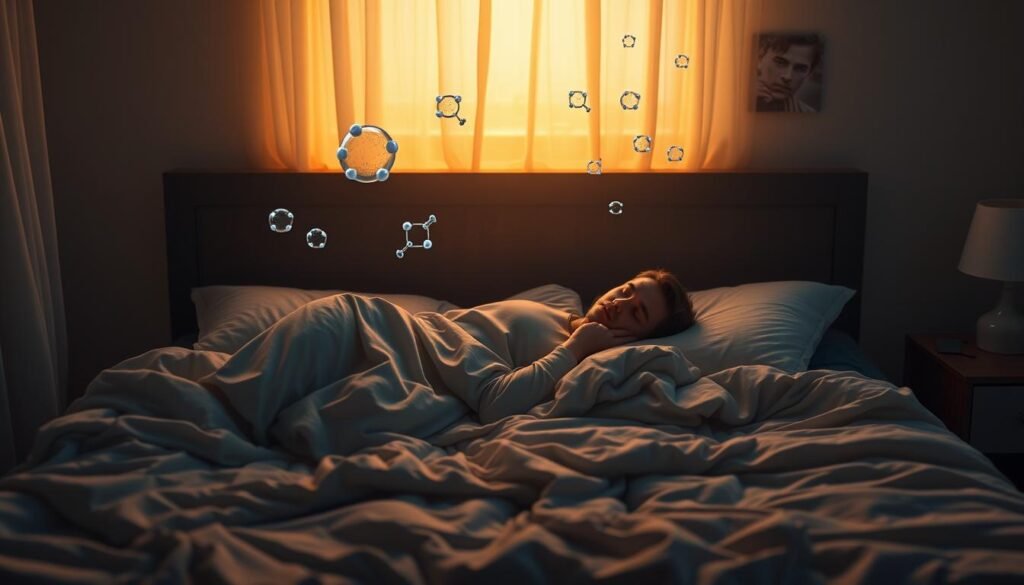Did you know about 40% of men over 45 struggle with low testosterone? This often leads to feeling tired and less motivated. It’s vital to understand how does low testosterone cause fatigue for those affected. Testosterone plays a key role in our health and energy. If levels fall below 250-800 nanograms per deciliter (NG/dL), various issues can arise, affecting mind and body. This article will explore the link between low testosterone and fatigue, including symptoms, treatments, and ways to feel better. For more on the connection between low testosterone and tiredness, check out this resource.
Key Takeaways
- Low testosterone levels affect nearly 40% of men over 45 years old.
- Symptoms of low testosterone include fatigue, irritability, and mood swings.
- Healthy testosterone levels range from 250-800 NG/dL.
- Low T fatigue is linked to various physical and mental health issues.
- Recognizing symptoms early can lead to effective treatments.
- Lifestyle changes can help boost testosterone levels naturally.
Understanding Testosterone and Its Role in Men’s Health
Testosterone is a key male hormone that affects men’s health in many ways. It is crucial for physical traits, muscle size, and how body fat is spread out. The role of testosterone goes beyond the body, affecting sex drive and overall sexual health. Men with the right amount of testosterone usually feel more energetic and have a better mood.
The effects of testosterone include influencing mood, mental sharpness, and memory. Testosterone levels change over a man’s life. They are highest in early adulthood and decrease as a man gets older. This decrease can lead to fatigue, especially if testosterone drops a lot. In fact, low testosterone can make 1 in 10 men feel really tired.
But low testosterone impacts more than just energy. It can lower sex drive, cause erectile dysfunction, and make it hard to focus. Since testosterone helps build muscle, not having enough can lead to weight gain. This happens because the body stores calories as fat rather than muscle. Also, low testosterone can cause sleep problems and mood swings, which can make doing well at work hard.
To really understand testosterone’s importance, it’s good to know about 2.1% of men might have Testosterone Deficiency Syndrome or Low-T. This is more common in older men. Getting a blood test can help find out if someone has low testosterone. Knowing how testosterone affects health is key for men who want to keep their vitality.
For more info on fighting fatigue from low testosterone and related health issues, visit this resource.
| Symptom | Description |
|---|---|
| Fatigue | Commonly reported by 1 in 10 men experiencing low testosterone levels. |
| Reduced Libido | Decreased interest in sexual activity often linked to low testosterone. |
| Erectile Dysfunction | Difficulty in achieving or maintaining an erection. |
| Mood Changes | Lower testosterone levels can result in increased irritability and mood swings. |
| Weight Gain | Reduced muscle mass leads to an increase in body fat percentage. |
| Insomnia | Difficulty sleeping can be a symptom of low testosterone levels. |
What Are Low Testosterone Levels?
“Low T,” short for low testosterone, means testosterone levels are below 300 ng/dL. Men often start losing testosterone in their thirties, at about 1% a year. Knowing why testosterone levels fall is key to treating it right.
There are two kinds of hypogonadism: primary and secondary. Primary hypogonadism is due to testicle issues. Secondary hypogonadism is caused by problems in the pituitary gland or hypothalamus. Diagnosing it means checking various factors, including a range of symptoms like tiredness, low sex drive, and erection problems.
Some think testosterone should stay high as they age. This is wrong and makes men miss signs of low testosterone. Spotting these signs matters because they affect your body and mind, leading to weight gain, less muscle, and even depression. The health risks of untreated low testosterone are real, so seeing a doctor early is crucial.
Symptoms Associated with Low Testosterone
Low testosterone can lead to many symptoms that affect daily life deeply. One major symptom is fatigue. This can make people feel tired all the time, impacting daily tasks. It’s vital to recognize all symptoms of low testosterone for effective treatment.
Common Symptoms Beyond Fatigue
Aside from fatigue, other symptoms are crucial to notice. They include:
- Decreased libido and sexual dysfunction
- Reduced muscle mass and strength
- Increased body fat percentage
- Depression and mood swings
- Cognitive decline and difficulty concentrating
- Decreased motivation and vitality
This shows the complex impact of hormonal imbalance on health. For many aging men, accepting these symptoms is a key step to getting the right help.
Understanding Andropause Symptoms
Andropause is when testosterone levels drop as men get older. It’s like menopause but occurs gradually. Symptoms often include:
- Chronic fatigue and lowered energy
- Increased irritability and mood swings
- Lowered sexual function and interest
Acknowledging andropause symptoms is important. Understanding these signs and seeking treatment can greatly improve life quality. It’s crucial to see how testosterone affects overall health.
The Link Between Low Testosterone and Fatigue
Studies show a clear link between low testosterone levels and more fatigue. Many men with testosterone fatigue feel very tired all the time, which affects their daily life. Testosterone helps control energy by impacting metabolism, mood, and how the body performs physically.
After hitting 30, men’s testosterone levels drop about 1-2% every year. This drop is often noticed in their 50s or sometimes earlier. They might start feeling more tired, lose muscle, gain weight, and have trouble sleeping. These fatigue causes can make life less enjoyable.
Many men diagnosed with low testosterone report feeling more tired than usual. Studies confirm that these men feel less tired when they get treatment to normalize their testosterone.

It’s vital to understand how testosterone helps keep energy levels up. Keeping testosterone at the right level can boost energy and reduce tiredness. This allows men to enjoy an active life again.
| Age Group | Testosterone Decline (%) | Common Symptoms |
|---|---|---|
| 30-39 | 1-2% | Fatigue, decreased muscle mass |
| 40-49 | 1-2% | Fatigue, increased body fat |
| 50+ | 1-2% | Chronic fatigue, insomnia |
Does Low Testosterone Cause Fatigue? The Truth Revealed
Studies have found a clear link between low testosterone and feeling tired. Men with low testosterone often feel less energetic. This can hurt both their mind and body. Checking testosterone levels regularly becomes essential as men get older.
Research Findings on Testosterone Levels and Energy
Many studies show that low testosterone is tied to feeling less energetic. For example, over half the men treated with testosterone therapy felt more energized. Research shows aging men with low testosterone feel more tired than others. Testosterone therapy has been found to greatly boost energy and life quality.
The Impact of Testosterone Deficiency on Daily Life
Low testosterone can deeply affect everyday life. It leads to tiredness, mood changes, and thinking problems. This makes work harder and reduces physical activity. Low testosterone can also make someone irritable, harming relationships and emotional states. Knowing this can lead men to seek help and better their health. This addresses the wider effects of low testosterone on life quality.
How Low Testosterone Affects Sleep Quality
Low testosterone significantly influences sleep quality. It creates a complex relationship that affects overall health. Understanding this dynamic can help address issues related to sleep and fatigue.
Testosterone is vital for regulating sleep patterns. It especially impacts the amount of restful sleep a person gets.
Connection Between Testosterone and Restful Sleep
Multiple studies have shown that testosterone and sleep quality are closely linked. Men with low testosterone often experience fragmented sleep. This leads to waking up often during the night.
This kind of sleep disruption contributes to chronic fatigue. It means fewer energy reserves are available during the day. People facing these problems frequently notice their sleep quality getting worse, with symptoms intensifying over time.
Effects of Sleep Deprivation on Testosterone Production
Sleep deprivation greatly affects testosterone production. Research shows that not getting enough sleep can lead to significant drops in testosterone levels. Some studies indicate reductions of up to 15% after just one week of poor sleep.
This cycle of low testosterone and poor sleep perpetuates fatigue and sleep difficulties. It leads to worsening health. To fight these issues, promoting good sleep hygiene is crucial. It helps maintain healthy testosterone levels and combat fatigue.

Testosterone Replacement Therapy: A Potential Solution
Testosterone Replacement Therapy (TRT) is a treatment choice for men with low testosterone. It aims to ease symptoms like tiredness, mood changes, and poor cognitive performance. Knowing the testosterone replacement therapy benefits helps individuals think about TRT when they have low testosterone symptoms.
Benefits of Testosterone Replacement Therapy (TRT)
TRT has many benefits for those with hypogonadism. Main advantages include:
- Improved energy levels and less fatigue, making testosterone treatment for fatigue more effective.
- Better mood and motivation, which cuts down sadness or depression.
- More muscle and stronger bones, fighting some effects of lower testosterone.
- Possibly better sexual health, though evidence on vitality and energy benefits is still limited.
Understanding Hypogonadism Side Effects
Though TRT has major benefits, it’s key to know the hypogonadism side effects and testosterone therapy risks. Some may have:
- Mood changes and emotional swings.
- Worse sleep apnea.
- Skin reactions where it’s injected or applied.
- Higher chance of heart problems and blood clots.
- Increased estrogen causing breast tissue growth.
Talking to a healthcare provider about these risks is important before starting TRT. Regularly checking testosterone levels ensures the treatment is right for the patient’s health.
| Benefit of TRT | Potential Side Effect |
|---|---|
| Increased energy levels | Mood swings |
| Improved muscle mass | Worsening of sleep apnea |
| Enhanced mood | Risk of cardiovascular issues |
| Improved sexual function | Increased estrogen levels |
Natural Ways to Boost Testosterone Levels
To boost your testosterone levels naturally, you can make some changes. Adjust your diet and your workout routine. These changes will help you fight low testosterone effectively.
Diet and Nutrition Considerations
If you have low T, your diet matters a lot. Eat foods with zinc and vitamin D to help make testosterone. Your diet should have:
- Leafy greens and multicolored fruits for vitamins and antioxidants
- Nuts, particularly Brazil nuts, for selenium
- Lean proteins from sources like chicken and fish
- Healthy fats, such as avocados and olive oil
Eat less sugar and bad fats. Some dietary supplements, like zinc, quercetin, and DHEA, help too. A balanced diet keeps your weight in check and boosts overall well-being.
Importance of Exercise and Weight Management
Regular exercise is key to increasing your testosterone. Resistance training, like lifting weights, is really effective. Short, high-intensity workouts also boost your levels.
Keeping a healthy weight is critical too. Too much body fat lowers testosterone. Avoid a sedentary life by staying active. Focusing on good food and exercise improves your energy and health.

The Role of Stress and Cortisol in Fatigue
Stress and hormones are closely linked, especially when it comes to feeling tired. Stress makes your body release cortisol, a hormone that can really affect testosterone. When cortisol is high, it can mess up the balance of hormones in your body. This can lead to less testosterone being made.
Because of this, you might feel more tired from stress. It’s important to look at ways to handle stress better.
How Stress Affects Hormone Levels
Stress directly affects how our hormones work. Cortisol levels are usually high in the morning and drop as the day goes on. But, if you’re stressed all the time, cortisol stays high. This constant high level of cortisol can break down muscle protein and cause hormonal imbalances.
These imbalances can mean less testosterone is produced. Additionally, stress can cause sleep problems. Such sleep issues can make hormone problems worse, leading to more tiredness and less energy.
Strategies to Reduce Stress and Improve Energy
There are effective ways to cut down on stress and boost energy levels. Consider these methods:
- Regular Exercise: Physical activity can help lower cortisol and make sleep better. This helps keep hormones balanced.
- Healthy Diet: Eating foods like whole grains, vegetables, and fruits can lower cortisol. Foods high in added sugars and fats do the opposite.
- Mindfulness Practices: Meditation and deep breathing can lower stress and improve your well-being.
- Social Connections: Having good support from friends or family can help you deal with stress.
- Sleep Hygiene: Getting good sleep is important for dealing with stress and keeping cortisol in check.
Adding omega-3 fatty acids to your diet and trying supplements like ashwagandha might help balance cortisol and testosterone. Understanding how stress affects testosterone is key. It helps you take control of your energy and overall health.
Consulting a Healthcare Professional
Knowing when to see a healthcare expert for testosterone checks is key for good hormonal health. If you feel constantly tired, less interested in sex, or moody, get checked out. These signs may be due to low testosterone. Getting help early can diagnose and treat this issue quickly. It also deals with other fatigue-related health problems.
When to Seek Testing for Testosterone Levels
Men should watch for certain signs that suggest a hormone check is needed. These include:
- Chronic fatigue and low energy levels
- Decreased libido or erectile dysfunction
- Muscle weakness or loss of strength
- Mood changes, irritability, or depression
- Cognitive difficulties such as trouble concentrating
Over a third of men above 45 face low testosterone issues. Knowing the symptoms is crucial. A doctor’s visit can tell if tiredness is from low testosterone or something else.
Other Conditions to Consider
Other health problems can also make you feel tired. Let’s look at some:
| Condition | Symptoms |
|---|---|
| Thyroid Dysfunction | Weight changes, mood swings, and fatigue |
| Sleep Apnea | Excessive daytime sleepiness, snoring, and fatigue |
| Vitamin Deficiencies | Fatigue, weakness, and cognitive difficulties |
| Chronic Illnesses (e.g., Diabetes) | Fatigue, low energy, and other metabolic symptoms |
Doctors will check for these issues and talk about testosterone level testing. A detailed check-up leads to the right diagnosis. Then, the doctor can suggest the best treatments. This approach helps improve your health.
Patient Experiences: Real-Life Impacts of Low Testosterone
Men with low testosterone share personal stories on testosterone that show their paths and struggles. These stories often reveal the real-life effects of low T, showing how it changes daily life. Many men, especially in their mid-30s and older, notice their energy, mood, and looks change as testosterone drops.
Many say they feel more tired and lack the energy they once had. For example, Matt, who’s 43, saw his tiredness drop after starting treatment. His testosterone went up from 10.5 to 23 in five months. These stories show how treating low testosterone can bring back energy and improve life.
Others, like 29-year-old David, noticed better moods and more energy. His levels went up from 4.5 to 13 in about 5 or 6 months of treatment. Stories of low testosterone experiences show the value of spotting and treating it early. Often, fatigue, less interest in sex, and mood swings are big worries.
Men also share how low testosterone affects their social life and relationships. This issue often leads to anxiety and depression. These feelings stress the need for more awareness about low testosterone and available treatments.
Speaking with doctors can help start the recovery process and improve well-being. Adding lifestyle changes to treatment also helps. Readers interested in managing symptoms and getting healthier through diet and stress control can check out this link.
Conclusion
There’s a big link between low testosterone and feeling very tired. This tiredness sticks around even after you rest well. Testosterone is key for thinking clearly, staying in a good mood, having a healthy sex life, and keeping muscles strong. When its levels drop, tiredness is often felt by both men and women. This can happen as people get older or if they have certain health issues. It’s important to know this and take steps to stay healthy.
Eating right, staying active, and sometimes getting testosterone replacement therapy (TRT) can help beat this tiredness. People who get treated for low testosterone say they feel more energetic. They also feel better emotionally and mentally. By understanding this link, folks can tackle these symptoms head-on. This improves how they handle daily tasks.
If you’re dealing with these issues, getting advice from a professional is a key step. Looking into treatments that are right for you can make a big difference in your health. Websites like detailed guides on low testosterone symptoms offer more info. They help you make smart choices for better health, leading to a more active and happy life.